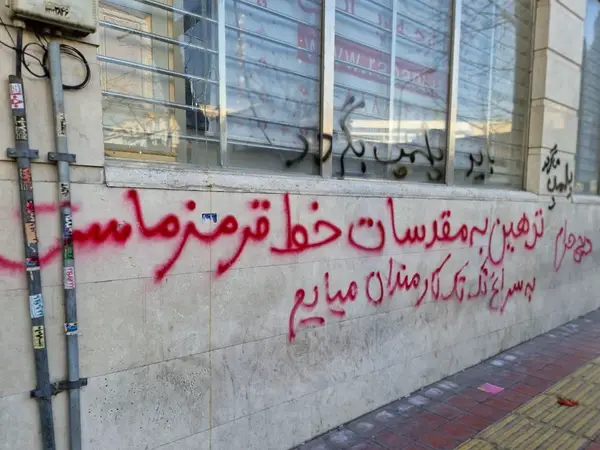Two days after Iran’s judiciary accused online retailer Digikala of blasphemy, pro-government vigilantes wrote threatening messages on the walls of the company’s building in Tehran.
On Saturday, social media users in Iran shared images of the slogans written in red and black on the building’s walls. Messages such as “Blasphemy is our red line,” “It must be shut down,” and “We will go after every single employee” conveyed ominous threats.
Digikala has faced criticism for designing mugs, cups, and shoes with names and humorous short texts, some of which reference holy Shia figures like Fatemeh Zahra, the daughter of Islam’s prophet.
Iran’s judiciary denounced these designs as “sacrilegious” and declared that Digikala would face prosecution in Tehran’s general and revolutionary courts. No further details regarding the complaint have been disclosed.
Some users argue that many Iranians have religious names, suggesting that Digikala’s use of such names in its designs is not inherently sacrilegious or blasphemous.
This is not the first time the Islamic Republic’s judiciary has targeted Digikala, the largest online retailer. In February 2023, the company’s office building was attacked after photos surfaced showing female Digikala employees without hijab, prompting calls from hardliners to take action against the company and its staff.
Digikala employs tens of thousands of individuals, subcontractors, and businesses that supply its merchandise.
Independent news website Rouydad24 criticized the judiciary for penalizing businesses over hijab enforcement, questioning why online enterprises are being shuttered amid economic challenges.
Donya-ye Eqtesad newspaper echoed these concerns, highlighting the impact of online business closures on employees, contractors, and others in the industry, particularly when the economy is a pressing national issue.
In addition to Digikala, the Iranian regime has closed thousands of businesses in recent months for failing to comply with mandatory hijab regulations, resulting in significant job losses. Restaurants, cafes, bookstores, and hotels have faced closure or warnings due to staff and patrons violating hijab rules.
Since the death of Mahsa Amini in police custody in September 2022, sparking the Women, Life, Freedom protests, civil disobedience has grown increasingly challenging for the regime to suppress. Daily images of women without compulsory hijab continue to circulate online.
In response, Iranian authorities have implemented various measures, including sealing commercial venues, restricting services to women without hijab, issuing warnings, and employing car seizures and violent arrests.
In September, the Iranian parliament approved a bill titled “Protection of Family Through Promotion of Hijab and Chastity Culture,” outlining penalties, including hefty fines, for deviation from Islamic dress codes.
Armita Geravand, a sixteen-year-old girl, was one of the latest victimsof the regime’s repressive hijab policy. She died on October 28 after spending about a month in a coma due to brain damage sustained during a violent encounter with hijab enforcers at Tehran’s subway stations. Her funeral, held at Tehran’s Behesht-e Zahra cemetery, was heavily guarded.
According to HRANA’s annual report for 2023, 44 women were detained for women’s rights activism, with at least 20 activists sentenced to 182 months in prison, along with fines. Two individuals also received sentences of 222 lashes.
